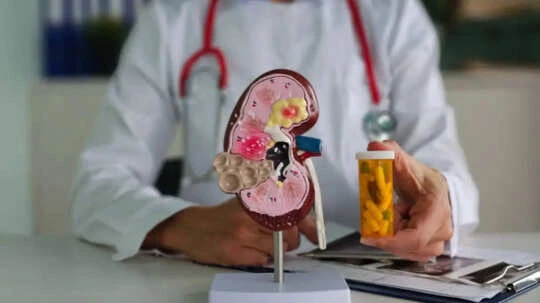Over-the-counter painkillers are among the world’s most commonly used medications, as they help relieve the debilitating symptoms. Whether you have a headache, muscle ache, arthritis, or even post-operative pain, most people reach for a painkiller without a second thought.
Even though they are super effective in providing instant relief, what you may not realise is their potential impact on your kidneys.
According to experts, many people succumb to kidney failure as a result of prolonged and inappropriate painkiller use.
How do painkillers damage your kidneys?
A few ways painkillers can impair your kidney functions include:
Reduced blood flow to the kidneys
Most painkillers – including NSAIDs – interfere with the production of prostaglandins, which dilate blood vessels in your kidneys. Reduced prostaglandin levels lead to your blood vessels narrowing, resulting in decreased blood flow.
Interstitial nephritis
It happens due to inflammation of your kidney’s filtering units – also known as nephrons. Doctors say it gets triggered by allergic reactions to medicines like painkillers.
Chronic kidney disease
Chronic kidney disease, or CKD, happens due to long-term use of painkillers, especially in high doses or combinations. It causes a gradual loss of kidney function, and as the damage accumulates over time, it goes unnoticed until the condition becomes severe.
Electrolyte imbalances
Painkillers impair your kidneys’ ability to maintain a proper balance of electrolytes like potassium, sodium, and calcium, which may lead to fatigue, irregular heartbeat, or muscle weakness.
Dehydration
Painkillers can reduce your kidneys’ ability to conserve water and increase the risk of dehydration, which further reduces blood flow, worsening any existing damage.
What are the signs and symptoms of kidney damage?
According to experts, kidney disease is often referred to as a silent killer because it may not show symptoms until significant damage has occurred. However, a few early warning signs may include:
- Fatigue or weakness
- Swelling in the legs, ankles, or face
- Changes in urination
- Nausea or vomiting
- Loss of appetite
- Difficulty concentrating
- Shortness of breath
- High blood pressure
- Persistent itching
Easy ways to take care of your kidneys
When it comes to taking painkillers, which are often necessary, you can take a few important steps to protect the health of your kidneys:
Do not take painkillers without a prescription.
Never indulge in any kind of painkillers for more than a few days without consulting your doctor, especially if you have underlying health conditions. Always follow the label instructions.
Do not drink alcohol
The entire time you are on a painkiller dosage, make sure to avoid drinking alcohol, as it directly affects your kidney health.
Avoid caffeine
Avoid combination painkillers with multiple active ingredients like caffeine, and never take your pill with tea or coffee.
Stay hydrated
It is important to drink water and fluids adequately and stay hydrated to support kidney function, which helps reduce the risk of painkiller-induced damage.
Do not combine painkillers
It is important to avoid taking multiple painkillers together, like combining ibuprofen with aspirin, as it can increase the risk of toxicity.
